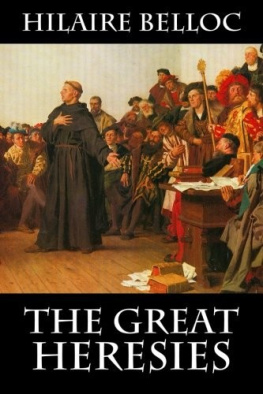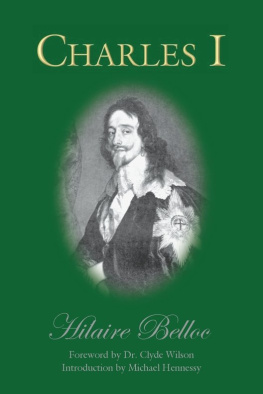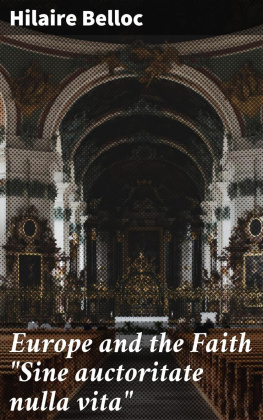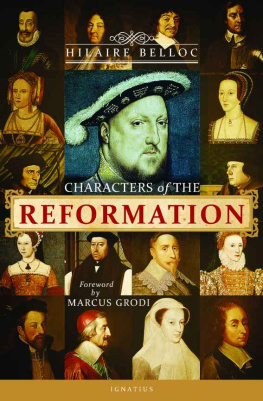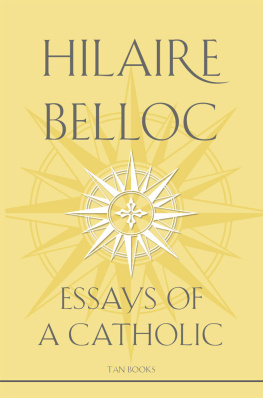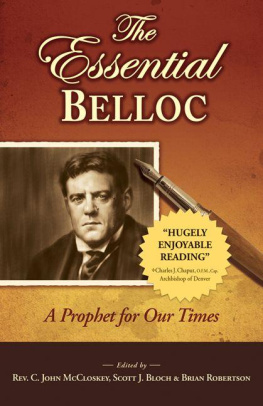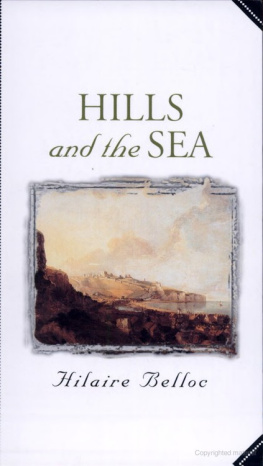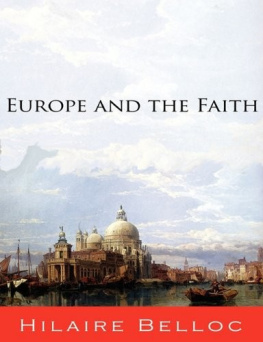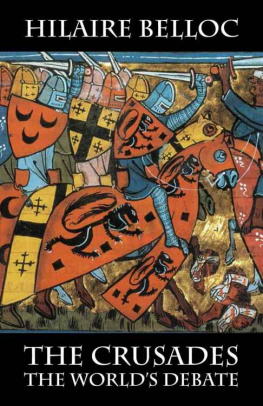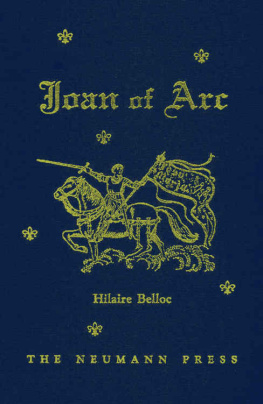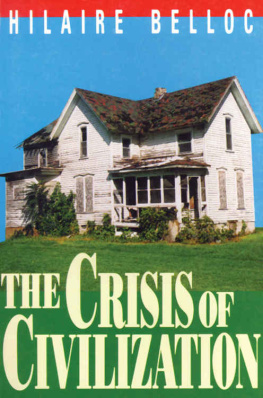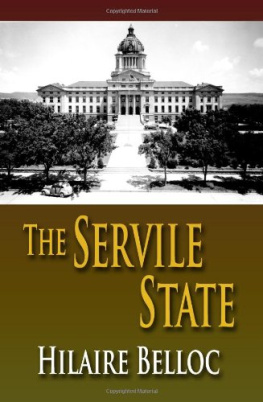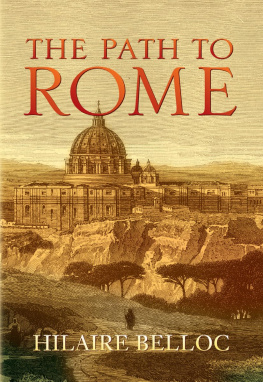TABLE OF CONTENTS
THE GREAT HERESIES
INTRODUCTION: HERESY
What is a heresy, and what is the historical importance of such a thing?
Like most modern words, "Heresy" is used both vaguely and diversely. It is used vaguely because the modern mind is as averse to precision in ideas as it is enamored of precision in measurement. It is used diversely because, according to the man who uses it, it may represent any one of fifty things.
Today, with most people (of those who use the English language), the word "Heresy" connotes bygone and forgotten quarrels, an old prejudice against rational examination. Heresy is therefore thought to be of no contemporary interest. Interest in it is dead, because it deals with matter no one now takes seriously. It is understood that a man may interest himself in a heresy from archaeological curiosity, but if he affirm that it has been of great effect on history and still is, today, of living contemporary moment, he will be hardly understood.
Yet the subject of heresy in general is of the highest importance to the individual and to society, and heresy in its particular meaning (which is that of heresy in Christian doctrine) is of special interest for anyone who would understand Europe: the character of Europe and the story of Europe. For the whole of that story, since the appearance of the Christian religion, has been the story of struggle and change, mainly preceded by, often, if not always, caused by, and certainly accompanying, diversities of religious doctrine. In other words, "the Christian heresy" is a special subject of the very first importance to the comprehension of European history, because, in company with Christian orthodoxy, it is the constant accompaniment and agent of European life.
We must begin by a definition, although definition involves a mental effort and therefore repels.
Heresy is the dislocation of some complete and self-supporting scheme by the introduction of a novel denial of some essential part therein.
We mean by "a complete and self-supporting scheme" any system of affirmation in physics or mathematics or philosophy or what-not, the various parts of which are coherent and sustain each other.
For instance, the old scheme of physics, often called in England "Newtonian" as having been best defined by Newton, is a scheme of this kind. The various things asserted therein about the behaviour of matter, notably the law of gravity, are not isolated statements any one of which could be withdrawn at will without disarranging the rest; they are all the parts of one conception, or unity, such that if you but modify a part the whole scheme is put out of gear.
Another example of a similar system is our plane geometry, inherited through the Greeks and called by those who think (or hope) they have got hold of a new geometry "Euclidean." Every proposition in our plane geometry-that the internal angles of a plane triangle equal two right angles, that the angle contained in a semi-circle is a right angle, and so forth-is not only sustained by every other proposition in the scheme, but in its turn supports each other individual part of the whole.
Heresy means, then, the warping of a system by "Exception": by "Picking out" one part of the structure[1] and implies that the scheme is marred by taking away one part of it, denying one part of it, and either leaving the void unfilled or filling it with some new affirmation. For instance, the nineteenth century completed a scheme of textual criticism for establishing the date of an ancient document. One of the principles in this scheme is this-that any statement of the marvellous is necessarily false. "When you find in any document a marvel, vouched for by the supposed author of that document, you have a right to conclude" (say the textual critics of the nineteenth century, all talking like one man) "that the document was not contemporary-was not of the date which it is claimed to be." There comes along a new and original critic who says, "I don't agree. I think that marvels happen and I also think that people tell lies." A man thus butting in is a heretic in relation to that particular orthodox system. Once you grant this exception a number of secure negatives become insecure.
You were certain, for instance, that the life of St. Martin of Tours, which professed to be by a contemporary witness, was not by a contemporary witness because of the marvels it recited. But if the new principle be admitted, it might be contemporary after all, and therefore something to which it bore witness, in no way marvellous but not found in any other document, may be accepted as historical.
You read in the life of a Thaumaturge that he raised a man from the dead in the basilica of Vienna in A.D. 500. The orthodox school of criticism would say that the whole story being obviously false, because marvellous, it is no evidence for the existence of a basilica in Vienna at that date. But your heretic, who disputes the orthodox canon of criticism, says, "It seems to me that the biographer of the Thaumaturge may have been telling lies, but that he would not have mentioned the basilica and the date unless contemporaries knew, as well as he did, that there was a basilica in Vienna at that date. falsehood does not presuppose falsehood in a narrator." There might even come along a still bolder heretic who should say, "Not only is this passage perfectly good evidence for the existence of a basilica at Vienna in A.D. 500, but I think it possible that the man was raised from the dead." If you follow either of these critics you are upsetting a whole scheme of tests, whereby true history was sifted from false in the textual criticism of recent times.
The denial of a scheme wholesale is not heresy, and has not the creative power of a heresy. It is of the essence of heresy that it leaves standing a great part of the structure it attacks. On this account it can appeal to believers and continues to affect their lives through deflecting them from their original characters. Wherefore, it is said of heresies that "they survive by the truths they retain."
We must note that whether the complete scheme thus attacked be true or false is indifferent to the value of heresy as a department of historical study. What we are concerned with is the highly interesting truth that heresy originates a new life of its own and vitally affects the society it attacks. The reason that men combat heresy is not only, or principally, conservatism-a devotion to routine, a dislike of disturbance in their habits of thought-it is much more a perception that the heresy, in so far as it gains ground, will produce a way of living and a social character at issue with, irritating, and perhaps mortal to, the way of living and the social character produced by the old orthodox scheme.
So much for the general meaning and interest of that most pregnant word "Heresy."
Its particular meaning (the meaning in which it is used in this book) is the marring by exception of that complete scheme, the Christian religion.
For instance, that religion has for one essential part (though it is only a part) the statement that the individual soul is immortal-that personal conscience survives physical death. Now if people believe that, they look at the world and themselves in a certain way and go on in a certain way and are people of a certain sort. If they except, that is cut out, this one doctrine, they may continue to hold all the others, but the scheme is changed, the type of life and character and the rest become quite other. The man who is certain that he is going to die for good and for all may believe that Jesus of Nazareth was Very God of Very God, that God is Triune, that the Incarnation was accompanied by a Virgin Birth, that bread and wine are transformed by a particular formula; he may recite a great number of Christian prayers and admire and copy chosen Christian exemplars, but he will be quite a different man from the man who takes immortality for granted.
Next page
